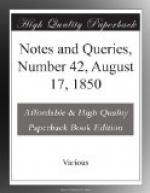St. Thomas of Lancaster’s Accomplices.—In No. 15. I find an extract from Rymer, by MR. MONCKTON MILNES, relative to some accomplices of St. Thomas of Lancaster, supposed to have worked miracles.—Query, Was “The Parson of Wigan” one of these accomplices, and what was his name? Was he ever brought to trial for aiding the Earl, preaching sedition in the parish church of Wigan, and offering absolution to all who would join the standard of the barons? and what was the result of that trial—death or pardon?
CLERICUS CRAVENSIS.
Prelates of France.—P.C.S.S. is desirous to know where he can meet with an accurate list of the Archbishops and Bishops of France (or more properly of their Sees) under the old regime.
Lord Chancellor’s Oath.—The gazette of the 16th July notified that the Right Hon. Sir Thomas Wilde, in council, took the oath of Lord Chancellor of Great Britain and Ireland on the 15th inst.; and the same gazette announced the direction of the Queen that letters patent be passed granting the dignity of baron to the Right Hon. Sir Thomas Wilde, Knt., Lord Chancellor of that part of the United Kingdom of Great Britain and Ireland called Great Britain.
Why, when he is only Chancellor of Great Britain, should he take the oath of Chancellor of Great Britain and Ireland?
J.
Mediaeval Nomenclature.—In what work is to be obtained the best information explanatory of the nomenclature of the useful arts in mediaeval times?
[Greek: delta]. {183}
Sir Christopher Sibthorp.—Can any of your readers furnish me with information as to the ancestry of Sir Christopher Sibthorp, whose name appears in the title-page of the following tract: A friendly Advertisement to the pretended Catholics of Ireland, by Christopher Sibthorp, Knt., one of H.M. Justices of his Court of Chief Place in Ireland, 1622, Dublin and also as to the crest, arms, and motto borne by him.
DE BALDOC.
Alarm (Vol. ii., p. 151.).—The derivation of alarm, and the French alarme, from a l’arme, which your correspondent M. has reproduced, has always struck me as unsatisfactory, and as of the class of etymologies suspiciously ingenious. I do not venture to pronounce that the derivation is wrong: I merely wish to ventilate a doubt through “NOTES AND QUERIES,” and invite some of your more learned readers to lily to decide the question.
Of the identity of the words alarm and alarum there is no doubt. The verb alarm is spelt alarum in old writers, and I have seen it so spelt in manuscripts of Charles II.’s reign, but unfortunately have not taken a “Note.” Dr. Johnson says alarum is a corruption of alarm. Corruption, however, usually shortens words. I cannot help having a notion that alarum is the original word; and, though I may probably be showing great ignorance in doing so, I venture to propound the following Queries:—




